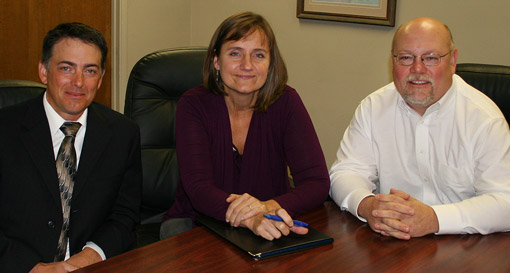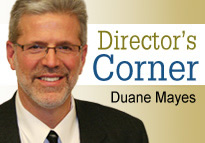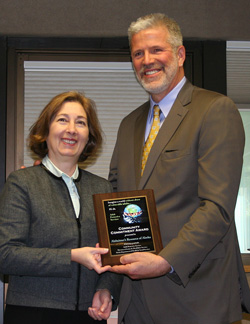New leaders at SDS 
SDS is lucky to have a talented team of managers. Here’s an introduction to a few of them who have taken new positions recently. Keith Burke and Lynne Keilman-Cruz are based in Anchorage; Jessica Bogard is based in Juneau.
- Keith Burke, Automated Service Plan Project Manager read more...
- Lynne Keilman-Cruz, Chief of Quality Assurance read more...
- Jessica Bogard, Budget Manager read more...
Alaska ramps up its fraud fight
The number of criminal prosecutions in Alaska’s home health industry has ramped up significantly in the last year: Alaska prosecuted 61 cases, up from a couple per year on average in recent years.
Andrew Peterson, the state assistant attorney general heading up the state’s Medicaid Fraud Control Unit, gets the credit for the crackdown, said SDS Director Duane Mayes and others. Peterson pointed to help he gets from others in making the prosecutions happen, from Lynne Keilman-Cruz and Doug Jones with the Alaska Department of Health & Social Services, to special agents in other state and federal agencies such as the FBI, U.S. Department of Health & Human Services’ Office of Inspector General, and U.S. Immigration and Customs Enforcement. read more...

More than 60 fraud cases have been pursued by the state attorney general’s office over the past year, thanks in large part to teamwork between Andrew Peterson, head of the state’s Medicaid Fraud Control Unit; Lynne Keilman-Cruz, SDS Quality Assurance, and Doug Jones in Medicaid Program Integrity for the Alaska Department of Health and Social Services.
Common problems providers can watch for
SDS Quality Assurance Chief Lynne Keilman-Cruz and state Assistant Attorney General Andrew Peterson talked about the most common problems they see, and gave these tips for avoiding trouble: read more...
![]()
Remember to update disability registry profiles!
Alaskans with a profile on the state’s developmental disabilities registry need to update it at least once a year. The profile asks people 1) what services they need now, and 2) what they think they’re going need later on. This information does two important things:
- It ensures individuals get linked to the right long term supports through a Medicaid waiver as soon as possible after they’re drawn from the registry, and
- It allows the state to anticipate the changing needs of the overall DD population, and plan ahead to meet those new needs.
For example, the registry can indicate how many Alaskans who experience developmental disabilities are likely to age out of high school in a given year. The state might then offer classes on helping Alaskans at that stage in their lives, so providers’ skills match Alaska families’ needs.
“The disability registry” is shorthand for the Developmental Disabilities Registration and Review, or DDRR.
Waiver regulations update
A comprehensive overhaul of SDS’ Medicaid waiver regulations went live on July 1. The changes to improve recipient health and safety were years in the making and touched nearly every aspect of the program.
Primarily the new regulations strengthen safeguards for recipients. For example, there are stiffer requirements for medication administration, restraints and seclusion and critical incident reporting.
The changes also aim to make life easier for providers, who requested some of the updates. Now providers will have:
• More clarity on establishing client eligibility, such as when providers can expect a response to the different application phases.
• A process for getting an expedited application in case of a client emergency.
• A streamlined process for becoming certified to provide Medicaid waiver home and community based services.
“We tried to make [the certification process] clearer and less burdensome,” said Angela Salerno, manager for the Policy and Program Development unit. “We try to be responsive to providers to make things work better in the field.”
![]()
|
Thank you, Alzheimer’s Resource of Alaska!
Alaska’s Adult Protective Services unit presented its annual Community Commitment Award to Alzheimer’s Resource of Alaska for supporting Alaskans with Alzheimer’s or related dementia, and their caregivers, family and friends. The nonprofit’s services have been increasingly important as the state’s senior population grows at the fastest rate in the nation.
Currently 6,000 Alaskans experience Alzheimer’s, a 172 percent increase from 2,200 in 1990.
“Alzheimer’s Resource of Alaska served 120 communities statewide in fiscal year 2013,” said SDS Director Duane Mayes. “We give them our heartfelt thanks for all that they do to support this vulnerable population.
Dulce Nobre, executive director of Alzheimer’s Resource of Alaska, said her agency and APS share the mission of keeping clients in their home and community as long as is feasible, and that means a shared focus on safety.


